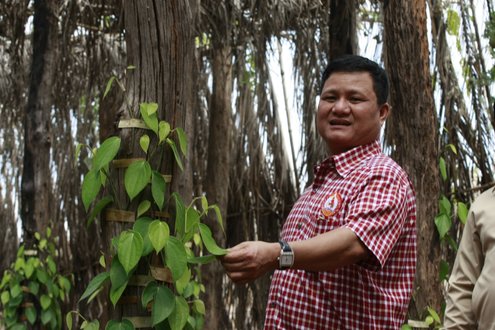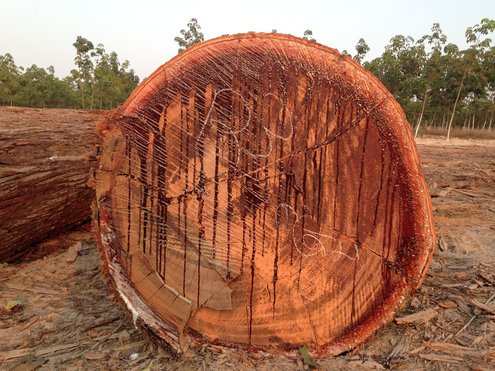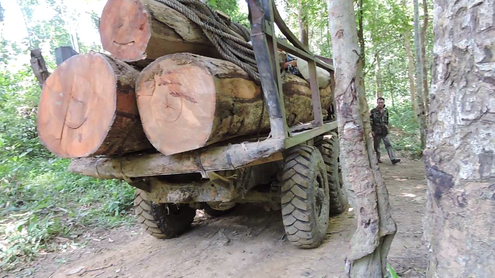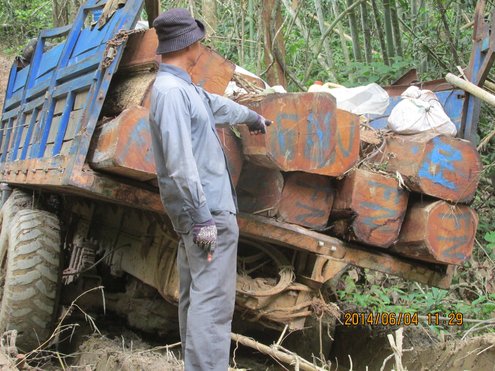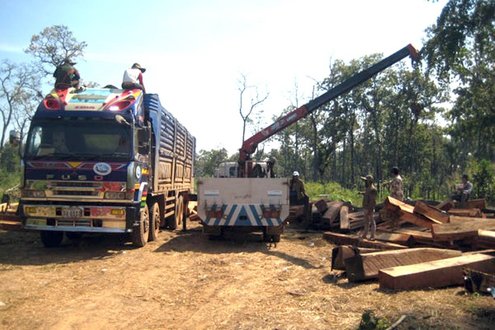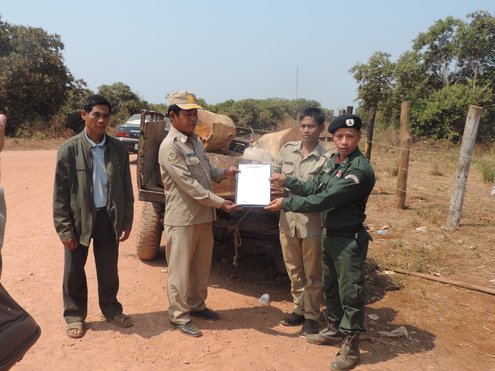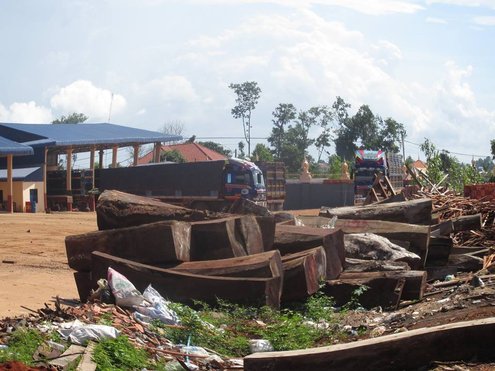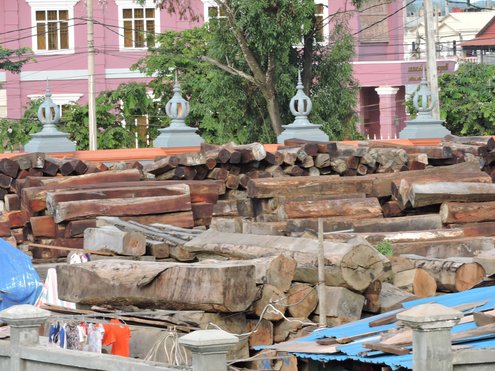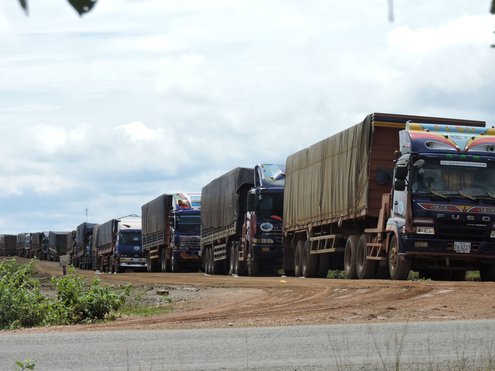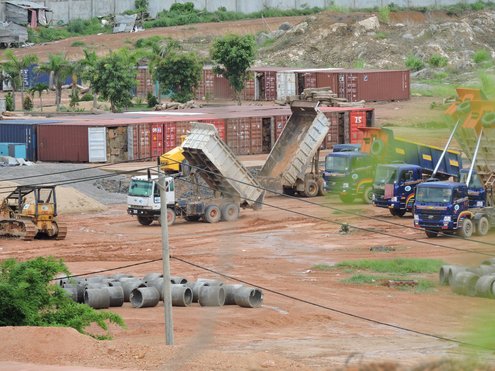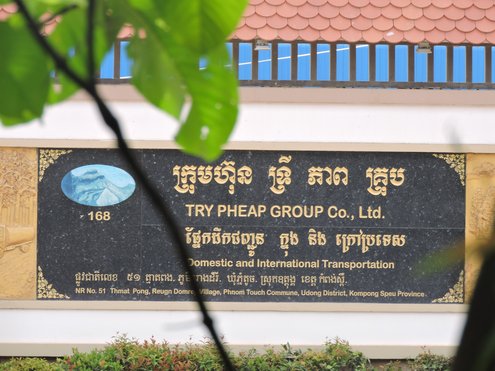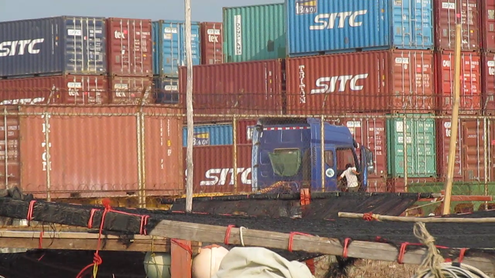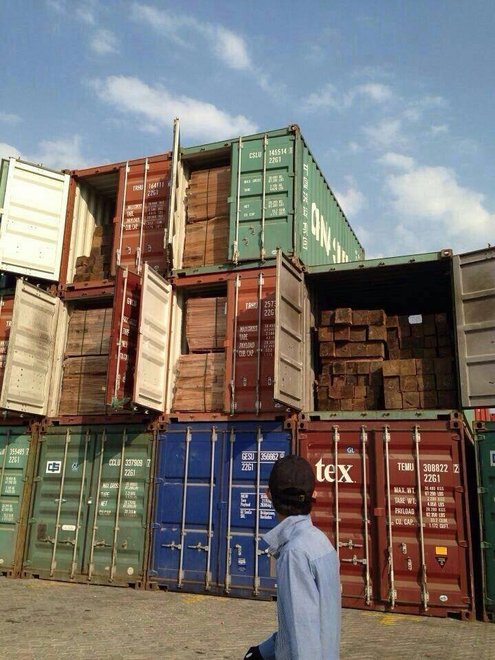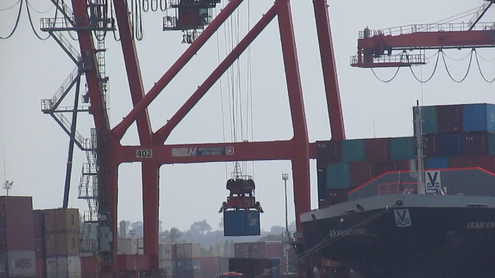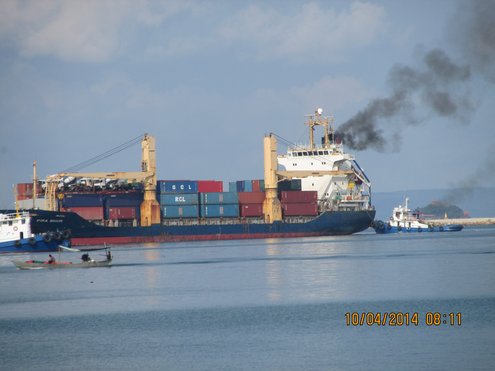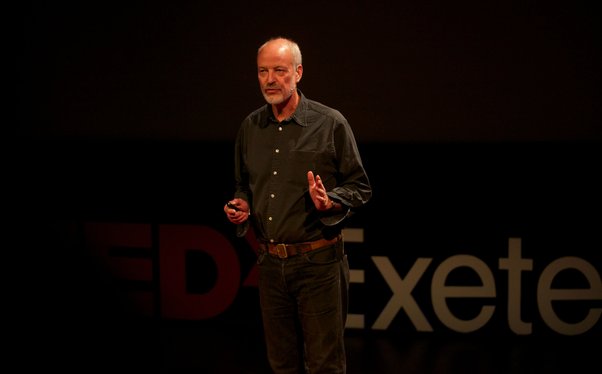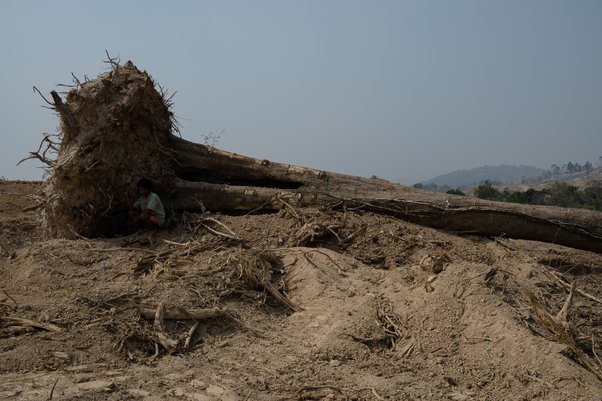The multi-million dollar timber smuggling operation in Cambodia is driving rare trees to extinction. Find out how we're campaigning to stop illegal logging.
This eight-month investigation recorded tonnes of rare timber being trucked out of Cambodia’s national parks and shipped to Hong Kong.
Logging of luxury-grade timber is outlawed in Cambodia, and the global trade in Siamese Rosewood has been restricted since 2013, but Chinese demand for antique-style Hongmu furniture is increasing and the illegal trade has ballooned since the ban was announced.
During months of interviews with loggers, state officials, police and activists, our investigators kept coming back to one man, who we’ve dubbed the 'King of Rosewood'.
Cambodian tycoon Oknha Try Pheap has connections at the highest levels of government and sits at the helm of an illegal logging network that relies on collusion with state officials and enforcement agencies to fell rare trees, traffic logs across the country and load them onto boats bound for Hong Kong.
This black market trade is destroying the livelihoods of indigenous and forest-dependent communities.
Follow our investigators as they track illegal luxury timber from Cambodia’s Virachey National Park to Sihanoukville port, where it is loaded onto boats bound for Hong Kong.
Oknha Try Pheap’s illegal logging network starts with individuals hired to seek out luxury timber, often inside national parks. Many local villagers say they were reluctant to become involved in the trade but were either threatened or coerced with ‘cash gifts’. Virachey National Park, Stung Treng Province, 2014.
Oknha Try Pheap, Director of the Try Pheap Group of companies, is a prominent Cambodian tycoon with strong links to both Prime Minister Hun Sen and his wife. The Group holds rights to almost 30,000 hectares of land concessions across the country much of which – as The Cost of Luxury reveals – are at stark odds with the law.
The Try Pheap Group is also illegally gutting forests within Economic Land Concessions – a leasing system intended not for logging but for large-scale agriculture – and using them to launder timber from surrounding protected areas. In February 2013 Try Pheap was given the rights to all timber cleared from such concessions in Ratanakiri Province. Prey Lang Forest, Kompong Thom Province, 2014.
Every month, Try Pheap Group loggers, local villagers and Ministry of Environment officials are described as demarcating a new, 10km area of intact forest in Virachey National Park that contains luxury timber. Much of Ratanakiri Province’s forests are now empty of rare tree species as a result.
Investigators spent eight months in forests across Cambodia tracking Oknha Try Pheap and his network of illegal loggers. This shows the GPS coordinates of a tree marking a new area in which luxury trees are to be logged. Veunsai District, Virachey National Park, Ratanakiri Province, 2014.
Once cut, luxury timber is loaded onto trucks, and transported to one of a series of timber depots owned by Oknha Try Pheap. Clearance in previously hard-to-reach forested areas has a devastating impact on the surrounding ecosystem and local communities.
Subcontractors hired by Oknha Try Pheap all have individual identification codes used to mark the trees they fell, so can be easily tracked. Virachey National Park, Stung Treng Province, 2014.
Many of the areas of Virachey National Park being targeted by the Try Pheap Group are so remote that timber must be transported across a number of large rivers to the depots. Sesan River, Stung Treng Province, 2014.
Oknha Try Pheap’s high level business and political connections provide his logging network with immunity from timber confiscations by forest enforcement agencies, some of whom are on his payroll. Preah Vihear Province, 2014.
Cambodia’s Forest Administration officers do still regularly intercept illegal timber, such as here in Ratanakiri Province in early 2014. Perversely, Oknha Try Pheap has been given exclusive rights to then collect this confiscated timber from government facilities across the country and sell it on through exports at a profit.
Oknha Try Pheap’s central timber depots in Ratanakiri Province are located in the provincial capital, Ban Lung.
From here, timber is driven either to the Group’s depot at the O’Yadav border crossing with Vietnam, or to another central depot in Udong, before being taken to the international port in Sihanoukville.
Try Pheap Group trucks have to queue up outside depots waiting for space before they can be loaded with timber, like outside this depot in Stung Treng Province, 2014. Timber loads are usually hidden under tarpaulins or within shipping containers.
Cambodian authorities have banned the export of logs, sawn timber thicker than 25cm and Siamese Rosewood. All three forms are visible in containers here, at the Group’s O’Yadav timber depot near the border with Vietnam.
Oknha Try Pheap’s central Cambodian timber depot is in Udong town, the former Royal capital. Trucks full of illegally harvested luxury timber arrive here from across the country, and the wood packed into shipping containers ready for export.
Over a period of four weeks in April 2014, researchers observed trucks owned by Try Pheap bringing on average 30 containers every day into Sihanoukville international port – the equivalent of 900m3 of timber.
Try Pheap Group’s containers containing illicit Siamese Rosewood are open for all to see at the international port in Sihanoukville. Here they are loaded onto ships bound for international markets.
Global Witness obtained documentation for two timber lots from the Try Pheap Group to the Kin Chung Transportation Co. Ltd in Hong Kong, valued at US$5.6 million. When contacted the Directors of the Hong Kong company claimed to have no knowledge of the Try Pheap Group and no idea why their company had been associated with such shipments.
Exports of rare timber species from Cambodia to China have sky-rocketed since 2012, despite their harvesting and export being entirely banned under Cambodian law, and the trade in Siamese Rosewood restricted by international law since 2013.
Those who oppose the illegal loggers put their lives on the line. Cambodia’s well-known environmental defender and forest crime investigator Chut Wutty was shot dead in 2012.
Six months later journalist Hang Sorei Oudom, who wrote extensively about the elite’s links to illegal forestry, was found dead in the boot of his car.
Global Witness is campaigning for a stop to illegal logging in Cambodia and the immediate suspension of all imports of rare Cambodian Hongmu timber by the Peoples Republic of China and Hong Kong officials.
